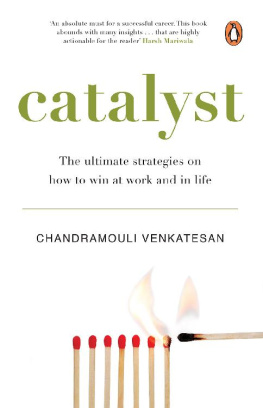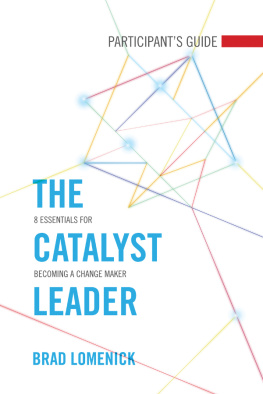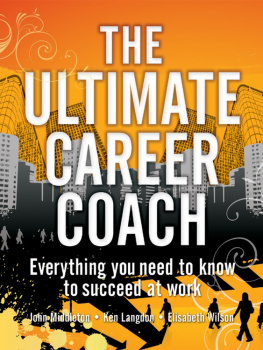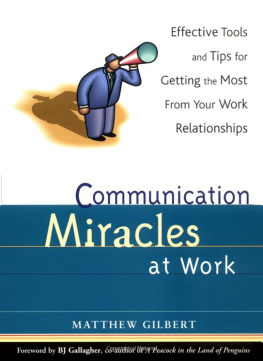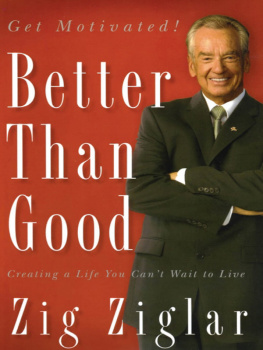Chandramouli Venkatesan is a corporate veteran with over twenty-six years of experience in the industry. He has worked with Asian Paints, Cadbury/Mondelez, Mirc Electronics/Onida and Pidilite. He has served in various senior capacities, including as CEO and managing director. While the bulk of his work life has been in business and P&L leadership roles, there was a three-year period when he did a cross-functional stint as HR head for Cadbury India which further developed his understanding of what makes people successful.
Chandramouli is a keen golfer and sports enthusiast, and believes in holding his life in balance. This, coupled with his sense of values and spirituality, has led him to believe that every person must impact society positively. He has conducted numerous speaking sessions, which have benefited over 1000 people, and mentored and guided many others to be successful in their careers.
Advance Praise for the Book
We often grow as people and professionals intuitively. But having a learning model helps us realize our full potential. Mouli provides practical advice on this and imbibing it will be helpful. The sports analogies add to making it an interesting read. It is a must-read for any ambitious manager.Piyush Pandey, executive chairman and executive creative director, South Asia, Ogilvy & Mather
Mouli has captured real insights from everyday events that happen to people in companies. I could relate to most lessons having experienced them in my own career. And it is written by somebody who has practised all that he is preaching now. A must-read.Anand Kripalu, managing director and CEO, Diageo India, and member, Diageo global executive committee
Converting time to experience is a great insight and an absolute must for a successful career. This book abounds with many insights like this which are highly actionable for the reader.Harsh Mariwala, chairman, Marico
Many books have been written on career growth and professional success in the past. However, Catalyst is truly insightful and thought-provoking. Every chapter of the book reflects a new dimension on the way an aspiring professional may need to look at their career glide path by identifying the right catalysts for sustained success. My kudos to Mouli for clearly articulating a complex subject in a compelling manner. The book is wisdom in paperback. I recommend all the young and aspiring business leaders to have a copy of this book in their office.Annaswamy Vaidheesh, vice president, South Asia, and managing director, India, GlaxoSmithKline Pharmaceuticals
Mouli has drawn from personal experience to construct an original, insightful and thought-provoking book. A must-read if you want to keep your career and life moving at a fast pace.Bharat Puri, managing director, Pidilite Industries Limited
Over 250 team members across the Godrej group have listened to Chandramouli speak on how to have a better career and lead a better life. I can confidently say that each one of us was incredibly inspired. This book is a great combination of motivational wisdom and practical, actionable insights.Vivek Gambhir, managing director and CEO, Godrej Consumer Products Limited
Even after forty years in the industry, I have found this book insightful and full of learning. Moulis persona as a fine business leader and good human being leads him to crystallize invaluable thoughts for the young to help shape their careers and lives.Sam Balsara, chairman, Madison World
To the catalysts of my lifemy parents, Meera,
Prerana, my family, my friends,
and Bharat and Anand
Introduction
Success Needs a Catalyst
I graduated with a degree in chemical engineering. Though I did not pursue a technical or an engineering career after that, some concepts from my graduation days have stayed with me. One such concept is how reactions are catalysed or the impact of the presence of a catalyst.
The basic concept is that the presence of a catalyst causes or accelerates a chemical reaction. In some cases, the ingredients are available, but the reaction does not happen spontaneously. It takes the catalyst to make it happen. In other words, the reaction has to be catalysed. There are many such examples around us in our daily life. E.g. automobile emissions contain carbon monoxide, which is highly dangerous. It has to be converted to carbon dioxide to make it less harmful. There is oxygen in the air, but it does not automatically react with this carbon monoxide to form carbon dioxide. It takes the catalytic converter fitted in automobiles for this reaction to occur. Another example is that of enzymes, which catalyse the digestive reactions in our body.
For a long time after my graduation, I continued to think of catalysts and catalyse as engineering terms. However, over many decades in the corporate world, I started to realize that even success at work and in life needs to be catalysedit doesnt happen by itself. Many people have the ingredients for success, but they mistakenly assume that just the presence of these will guarantee success. Unfortunately, that is not the case; it needs a catalyst, which comes in the form of specific actions and efforts.
This notion has been in my head for a long time. I have also learnt from experience that success is the result of a holistic process. It is about catalysing a lot of reactions that most of us assume happen spontaneously. I have wanted to recount and share my experiences to help other people succeed using my learning. Towards this end, a few years ago, I built a module called Tee off with Mouli (the name comes from my passion for golf) and started sharing it with the people I was working with, in sessions of about three hours each. I got a very good response and also some good feedback, which I used to further refine the module.
In the middle of 2016, I decided that I needed a break from work. I wanted to take a sabbatical. I was also keen that it should not be only about relaxation and fun but also about making significant social impact using my experience and learning. I spent time thinking about the best way of giving back to society. I had several ideas, including working with NGOs, but finally felt that none of these would give a high ROI (return on investment). I strongly believe that one must look for ROI in ones social efforts. Just because we give our time/money/knowledge does not mean it is making an impact. This does not mean that we stop giving our time/money/knowledge. My only suggestion is that each one of us try and invest it where it has the highest ROI. E.g. if you are a doctor and you want to make a social impact, perhaps the highest ROI for your social contribution is in trying to improve the health of the needy. A doctor could make an impact teaching maths to underprivileged children, but the ROI here would be lower than the ROI in healthcare. As I started thinking along these lines, it came to memy highest ROI was going to be in helping people in the corporate sector achieve even greater success in their careers and lives. Their success would catalyse social impact and, over time, create employment and, in general, create a well-rounded, values-driven society.

